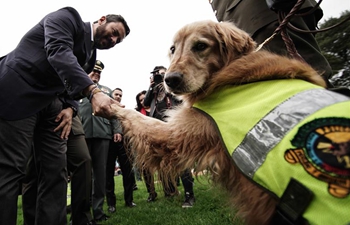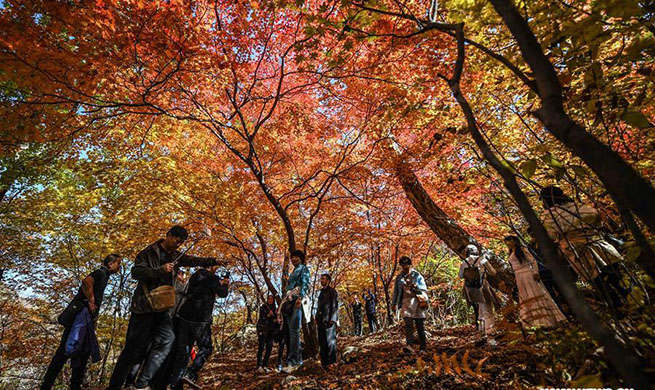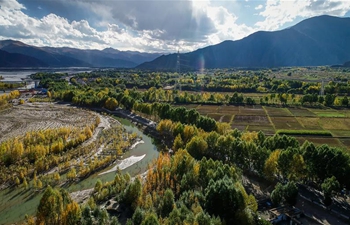ZHENGZHOU, Oct. 6 (Xinhua) -- Zhang Qiaoqiao had to quit school when she graduated from junior middle school to support her poor family and worked in a hair salon in the city of Shenzhen until last year when an archaeological excavation began in her home village.
Zhang, now 21, was born in Fuchang Village of Yiyang County which is administered by Luoyang City, central China's Henan Province.
Fuchang was listed as a provincial-level impoverished village, but it used to be strategically located and served as a courier station connecting the two capital cities during the Tang Dynasty (618-907). It has been confirmed that there are three ancient ruins of high archaeological value lying underneath the northern part of the village.
In 2015, Fuchang village officially started to be at the receiving end of the targeted poverty alleviation efforts headed by Luoyang cultural heritage bureau, which launched the archaeological excavation in the village last year.
"After a two-month intensive training that focused on the rudiments of the subject, such as mapping, I was permitted to shadow some of the professionals to gain hands-on experience in the field," said Zhang, who has become a junior technician one year after entering the field. "I have never thought about brushing past the subject of archaeology."
Like Zhang, many of the residents of Fuchang had a similar experience fighting poverty.
As of May this year, more than 1 million yuan (about 145,000 U.S. dollars) has been earmarked for cultural relics preservation in Luoyang. Nearly 100 villagers have been employed, with each villager earning about 1,000 yuan a month.
According to Jia Zhongbao, who was sent to the village by Luoyang cultural heritage bureau, there are three types of workers in the archaeological field: professional archaeologists in charge of research and management, technicians with ample experience in excavation, and crew for cleaning and transporting soil.
"The crew is largely made up of local villagers who can easily take on the task after a brief period of training," Jia said.
Wang Tiechen, 59, barely scraped by with 0.3 hectares of arid land before he was hired to work as a foreman in the field.
"It is difficult to get a job for someone at my age. But the steady income I have made from working in the field has lifted me out of poverty," he said.
"The historical and cultural value of Fuchang used to be grossly underrated," Jia said. "Through restoration, preservation and filing for protective status, we hope to officially put our village on the map of places of great archaeological importance and tap into its potential to generate profits for the betterment of our residents."
Villagers' paychecks are not the only thing the archaeology project has fattened. With the help of Luoyang cultural heritage bureau, a series of extracurricular activities aiming to broaden the horizons of the village children have been organized.
"The education resource was very limited in rural areas, and classes teaching pupils handcraft and arts were practically inaccessible in the past," said Qiao Xiaopin with Fuchang elementary school. "Thanks to the experts, our kids are able to experience this novel way of learning for the first time in their life."
As an apprentice in the hair salon in Shenzhen, south China's Guangdong Province, Zhang had managed to help her father to support her bed-ridden mother and school-aged younger sister. The archaeology work is not just increasing her income.
Now, Zhang spends most of her spare time reading up on historical literature to compensate for her lack of formal education in the subject.
"I used a hand shovel to gently scrape off the layer of soil that covered the object and a Q-tip to remove the dirt that had accumulated in the corners," Zhang said, reminiscing about the time she unearthed a Tang Dynasty relic. "Then a thousand-year-old silver hairpin with a butterfly-shaped turquoise inlay was able to see the light of day again."
"For me, the biggest excitement I'm able to draw from this job is the idea that I never know what I may discover."

















